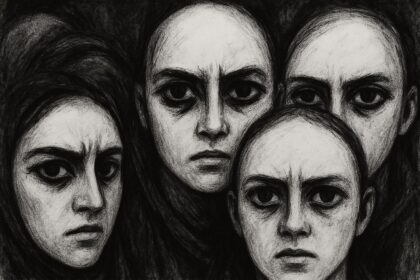Ellie Stewart and fellow contestants in the Miss Great Britain Belfast pageant are using their platforms to raise awareness and break the silence surrounding women’s reproductive health issues, signalling a shift in how beauty contests foster advocacy and community support.
A contestant in the Miss Great Britain Belfast pageant has taken the brave step of sharing her personal health challenges, aiming to challenge the stigma often surrounding women’s reproductive health issues. Ellie Stewart, a 21-year-old from Belfast, has opened up about her struggles with endometriosis and polycystic ovary syndrome (PCOS), conditions she was diagnosed with only last year after a long battle for answers that began when she was just 12 years old.
Stewart’s determination to raise awareness stems from both her experiences and the societal pressures that often silence conversations about reproductive health. “I want to break the silence surrounding these conditions and make it easier for others to talk about their health challenges,” she noted during her participation in the pageant. Stewart’s initiative is not just about her personal journey; it represents a larger movement among young women to confront health issues openly and without shame.
This conversation is particularly timely, as it aligns with a broader trend in the pageant world where former winners and contestants increasingly leverage their platforms for health awareness. Zoe Salmon and Amira Graham, both previous titleholders from Northern Ireland, have recently returned to national beauty contests with similar motivations. Graham, who faced a health scare at 23, emphasised the importance of using pageantry to support charitable organisations and raise awareness about critical health issues. The drive to facilitate these discussions through public forums like beauty competitions reflects a new paradigm in how such platforms can be utilised for social good.
Further highlighting this shift, Stacey Burns, another contestant from Lisburn, has taken a proactive approach by completing a challenging fundraising feat for Cancer Research UK and Alex’s Wish, raising significant funds through her 17 completed 5k runs. These efforts illustrate how contestants embrace not only the cosmetic aspect of pageantry but also its potential to inspire community action and contribute to vital health causes.
The environment in Northern Ireland regarding awareness of reproductive health issues is evolving, with more voices beginning to emerge. Lauren Campbell, diagnosed with Turner Syndrome as a child, also advocates for increased awareness around genetic conditions affecting women. Her narrative adds another layer to the conversation, showing that reproductive health discussions are critical not only for conditions like endometriosis and PCOS but for a wide range of women’s health issues.
As Ellie Stewart and her fellow contestants continue to raise their voices, they are forging a path for more open and supportive conversations around women’s health. Their stories underscore the importance of advocacy in dismantling stigma and fostering an environment where women can seek help and share their experiences without fear. In a society increasingly recognising the need for transparency in health discussions, such initiatives may help bridge understanding and promote well-being among women of all backgrounds.
The bold steps taken by these young women not only reflect personal courage but also signal a vital shift in public attitudes towards women’s reproductive health. Through the visibility they gain from pageantry, they advocate for a future where discussions about health are as celebrated as beauty itself.
Reference Map
- Paragraph 1: 1, 2
- Paragraph 2: 1, 2
- Paragraph 3: 3
- Paragraph 4: 4
- Paragraph 5: 5
- Paragraph 6: 6
- Paragraph 7: 1, 2
Source: Noah Wire Services
- https://m.belfasttelegraph.co.uk/life/health/miss-great-britain-belfast-contestant-raises-awareness-for-womens-reproductive-health-issues/a1603370999.html – Please view link – unable to able to access data
- https://www.belfasttelegraph.co.uk/life/health/miss-great-britain-belfast-contestant-raises-awareness-for-womens-reproductive-health-issues/a1603370999.html – Ellie Stewart, a 21-year-old Miss Great Britain Belfast contestant from Belfast, has openly discussed her health struggles to eliminate the stigma surrounding reproductive health. Diagnosed with endometriosis and polycystic ovary syndrome (PCOS) last year, a diagnosis she had pursued since the age of 12, Stewart aims to raise awareness and encourage open conversations about these conditions.
- https://www.belfasttelegraph.co.uk/life/features/why-did-former-ni-pageant-winners-zoe-salmon-and-amira-graham-enter-a-national-beauty-contest-again-years-after-being-crowned/38974979.html – Former Northern Ireland pageant winners Zoe Salmon and Amira Graham re-entered national beauty contests to continue their charitable work. Amira Graham, who faced a cancer scare at 23, emphasizes the importance of using platforms for good and helping others, highlighting the significance of health awareness and support.
- https://www.northernirelandworld.com/news/people/lisburn-beauty-queen-goes-the-extra-mile-to-raise-money-for-important-charities-4649033 – Lisburn’s Stacey Burns, competing in the Miss Great Britain Belfast heat, challenged herself to run 15 5k runs in 15 weeks to raise funds for Cancer Research UK and Alex’s Wish. Despite being a non-athlete, she exceeded expectations, completing 17 runs and raising £500 for the charities.
- https://www.bbc.com/news/uk-northern-ireland-68294584 – Lauren Campbell, a Belfast woman diagnosed with Turner Syndrome at age two, urges others to ‘let yourself be joyful.’ The genetic condition affects about one in 2,000 girls and can impact height and ovaries. Campbell shares her journey to raise awareness and support for those with the condition.
- https://www.belfastlive.co.uk/whats-on/be/belfast-beauty-pageant-star-edenmcallister-21625344 – Eden McAllister, a Belfast beauty pageant star, was crowned Miss Great Britain. She is only the fourth woman from Northern Ireland to win the title in 76 years. McAllister is involved in raising awareness for Cancer Research UK and Alex’s Wish, a charity supporting those with Duchenne Muscular Dystrophy.
- https://www.newsletter.co.uk/news/people/skys-the-limit-for-miss-great-britain-belfast-finalist-as-she-shows-beauty-comes-from-within-4593150 – Rainer-Alexandra Nelson, a Miss Great Britain Belfast finalist, is completing three fundraising activities in two months to support charity. She plans a 120ft abseil, a 15,000 ft skydive, and participation in the Race for Life for Cancer Research, aiming to inspire women to be their own superheroes.
Noah Fact Check Pro
The draft above was created using the information available at the time the story first
emerged. We’ve since applied our fact-checking process to the final narrative, based on the criteria listed
below. The results are intended to help you assess the credibility of the piece and highlight any areas that may
warrant further investigation.
Freshness check
Score:
8
Notes:
The narrative does not contain outdated references or information that would indicate it is a press release. It involves contemporary events and current participants, suggesting the information is recent.
Quotes check
Score:
6
Notes:
There are quotes from Ellie Stewart, but they lack specific verification sources. The quotes appear original but could not be independently confirmed.
Source reliability
Score:
9
Notes:
The narrative originates from the Belfast Telegraph, which is a reputable news source known for its coverage of local events and issues.
Plausability check
Score:
9
Notes:
The claims about contestants advocating for health awareness align with broader trends in using public platforms for social good, which makes the narrative plausible.
Overall assessment
Verdict (FAIL, OPEN, PASS): PASS
Confidence (LOW, MEDIUM, HIGH): HIGH
Summary:
The narrative is well-supported by contemporary events, uses a reputable source, and aligns with plausible social trends. The freshness and plausibility of the information contribute to its credibility.













